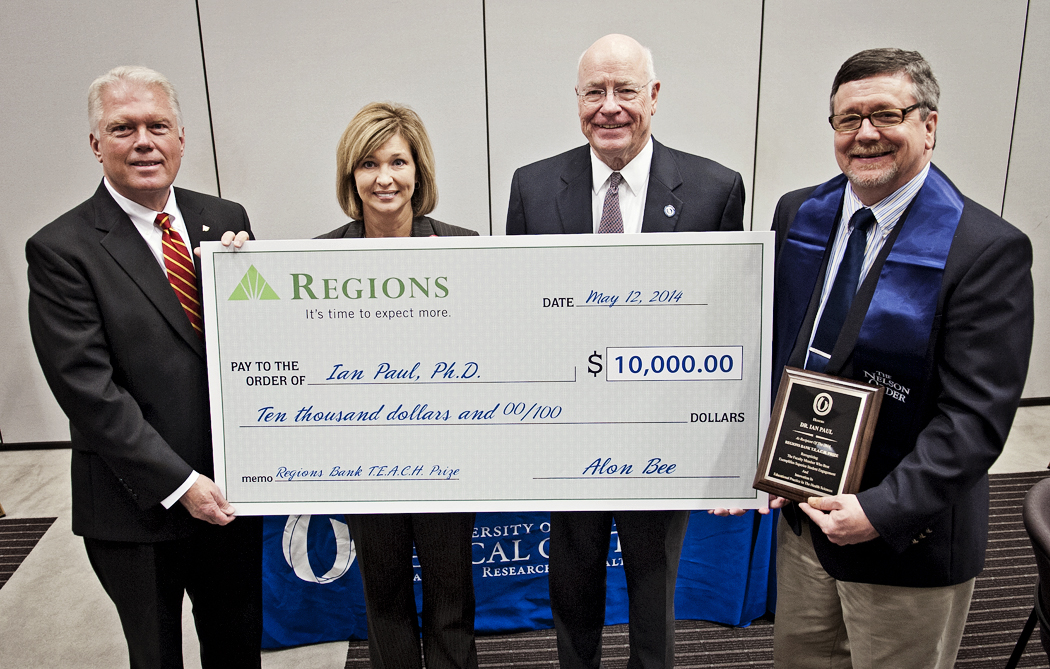Regions Bank recognizes UMMC neuroscientist with second annual TEACH prize

At nearly any point in the year, Dr. Ian Paul, School of Medicine professor of psychiatry and human behavior, can be found working with students.
Whether he’s guiding a post-doctoral fellow through the maze of writing a successful research grant application, mentoring a graduate student on gathering and presenting scientific data, teaching an undergraduate the basics of laboratory procedures, or speaking to group of high school seniors about research careers, Paul keeps himself involved.
It’s that dedication to education that won him the second annual Regions Bank TEACH Prize during a ceremony on May 12 at the University of Mississippi Medical Center.
The Toward Educational Advancement in Care and Health (TEACH) Prize includes a $10,000 check and recognizes a faculty member who engages students, challenges them intellectually and demonstrates the craft of education.
“I’m certainly honored to receive this award. However, this honor is as much a tribute to the faculty, students and staff of the Program in Neuroscience as it is to me. Without their dedication, creativity, hard work and patience, none of my work in graduate education could have gotten off the ground,” said Paul, a neurobiologist and behavioral researcher who also directs the Graduate Program in Neuroscience in the School of Graduate Studies in the Health Sciences.
Alon Bee, Regions Bank Metro Jackson president, presented Paul with a ceremonial check along with Dr. LouAnn Woodward, UMMC associate vice chancellor for health affairs, and Dr. James Keeton, vice chancellor for health affairs.
Paul earned his undergraduate degree in behavioral neuroscience from the University of Pittsburgh in 1983 and his Ph.D. in neurobiology at the University of North Carolina at Chapel Hill in 1989.
He came to UMMC as an assistant professor in 1993 from the National Institutes of Health. Paul was awarded tenure in 2000 and became a full professor in 2005. Two years later he established the Program in Neuroscience as the first interdepartmental graduate program at UMMC.
Throughout the past several years, he and a group of neuroscientists from UMMC and University of California, San Francisco have published numerous groundbreaking studies on rodents that point to possible links between early-life exposure to antidepressants, abnormal brain development and autism-like behaviors.
As with all his research, student learning played a major role.
“Teaching, for me, is an opportunity to connect the scientists of the past with those of the present and the future,” Paul said. “While all scientists want to make a difference during their careers, our successful trainees are really our most lasting legacy in science. If one scientist teaches just 10 successful students, his or her impact on the future of their field is tenfold greater than it could possibly have been, were they working alone in a laboratory.”
Whether he’s guiding a post-doctoral fellow through the maze of writing a successful research grant application, mentoring a graduate student on gathering and presenting scientific data, teaching an undergraduate the basics of laboratory procedures, or speaking to group of high school seniors about research careers, Paul keeps himself involved.
It’s that dedication to education that won him the second annual Regions Bank TEACH Prize during a ceremony on May 12 at the University of Mississippi Medical Center.
The Toward Educational Advancement in Care and Health (TEACH) Prize includes a $10,000 check and recognizes a faculty member who engages students, challenges them intellectually and demonstrates the craft of education.
“I’m certainly honored to receive this award. However, this honor is as much a tribute to the faculty, students and staff of the Program in Neuroscience as it is to me. Without their dedication, creativity, hard work and patience, none of my work in graduate education could have gotten off the ground,” said Paul, a neurobiologist and behavioral researcher who also directs the Graduate Program in Neuroscience in the School of Graduate Studies in the Health Sciences.
Alon Bee, Regions Bank Metro Jackson president, presented Paul with a ceremonial check along with Dr. LouAnn Woodward, UMMC associate vice chancellor for health affairs, and Dr. James Keeton, vice chancellor for health affairs.
Paul earned his undergraduate degree in behavioral neuroscience from the University of Pittsburgh in 1983 and his Ph.D. in neurobiology at the University of North Carolina at Chapel Hill in 1989.
He came to UMMC as an assistant professor in 1993 from the National Institutes of Health. Paul was awarded tenure in 2000 and became a full professor in 2005. Two years later he established the Program in Neuroscience as the first interdepartmental graduate program at UMMC.
Throughout the past several years, he and a group of neuroscientists from UMMC and University of California, San Francisco have published numerous groundbreaking studies on rodents that point to possible links between early-life exposure to antidepressants, abnormal brain development and autism-like behaviors.
As with all his research, student learning played a major role.
“Teaching, for me, is an opportunity to connect the scientists of the past with those of the present and the future,” Paul said. “While all scientists want to make a difference during their careers, our successful trainees are really our most lasting legacy in science. If one scientist teaches just 10 successful students, his or her impact on the future of their field is tenfold greater than it could possibly have been, were they working alone in a laboratory.”


